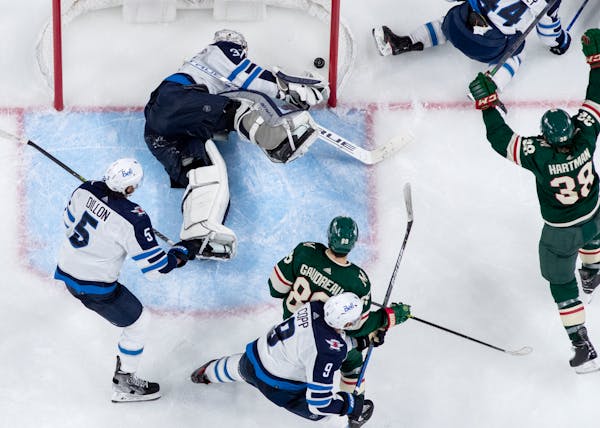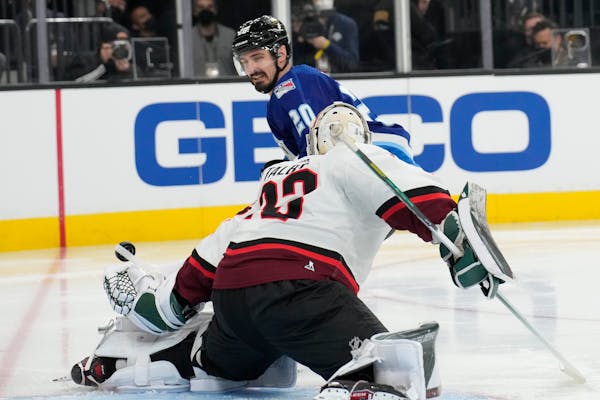Each player has an alias.
Jordan Greenway is "Greener," Joel Eriksson Ek "Ekker" and Marcus Foligno doubles as "Moose."
The Wild linemates, however, haven't christened their partnership with a nickname.
"We'll leave that up to the fans," Foligno said.
But the trio does have a reputation.
"People hate our line," Foligno said, "and they hate playing against us."
Forward lines in the NHL have long been assigned specific roles, from scorers and sparkplugs to checkers and match-up artists.
What's unique about Greenway, Eriksson Ek and Foligno is that they specialize in all areas instead of just one, a jack-of-all-trades combination that is one of the most dominant in the NHL — apparently to the chagrin of the opposition.
"They do a little bit of everything," coach Dean Evason said. "They play on the offensive side. They're all skilled. They can score. They're all physical. They're all defensively aware. They all kill penalties. They all play on the power play.
"They do everything."
How it started
Although they didn't open the season together, Greenway, Eriksson Ek and Foligno have been reunited when healthy, and they've rediscovered the formula that made them a force last year.
A combined 664 pounds with Greenway 6 feet, 6 inches and Eriksson Ek and Foligno each 6-3, the line developed a knack for stifling offenses.
"We think the game pretty similar," Eriksson Ek said, "but we all can contribute different stuff."
Foligno flexes his strength at right wing but doesn't get enough credit for his skill, Eriksson Ek said, while Greenway's assets on the left side are his stickwork and hockey IQ.
As for Eriksson Ek, the center, "I'm just trying to be the guy that skates up and down as much as I can, just try to support those two guys," he said.
Not only did the line face more top players than anyone else on the Wild last season, but the number of goals the team surrendered per 60 minutes when that line was on the ice (1.87) was among the lowest in the NHL for lines that played at least as many minutes as they did, according to Evolving-Hockey. Eriksson Ek went on to finish fourth in Selke Trophy voting, which recognizes the league's best defensive forward.
"We had to play against those three big boys over there that are pretty physical, come at you every shift," St. Louis' David Perron said after a game last May when he and linemates Ryan O'Reilly and Brayden Schenn spent most of a 4-3 overtime loss going head-to-head vs. Greenway, Eriksson Ek and Foligno. "It was a battle."
But the line's efficiency also extended to the other side of the puck, with all three setting career highs in points. Greenway led the Wild in assists (26), Eriksson Ek scored 19 goals after his previous best was eight, and Foligno ranked first in the NHL in shooting percentage among regulars at 27.5.
That's what transformed the three from a shutdown line into a two-way wrecking ball.
"Every time the puck goes into your O-zone when we're on the ice, you're probably going to get hit a couple times and you're going to have to work to get out of your D-zone," Greenway said. "After that, once you do get the puck, it's tough to go through us."
How it's going
Since Nov. 18, when Greenway, Eriksson Ek and Foligno started their first game together, the Wild is 13-3-2 when the line is in action.
They're one of only a few trios in the NHL that has logged consistent minutes without giving up a goal at 5-on-5, according to MoneyPuck. The line also generates expected goals at a rate 9 percent better than the league average and allows expected goals against at a rate 31 percent lower than the league average, according to HockeyViz.
"They're tough to handle," Wild defenseman Jordie Benn said. "I do it every day in practice. You get stiff-armed, and you can't do anything about it. And you see it in games. It translates from practice in a game. So it's crazy that you can be that big and move that good."
Foligno said he's somewhat aware of what the data says about the line, but Greenway and Eriksson Ek had no idea.
Greenway interprets the line's success by its performance on the ice, like how much he and his linemates possess the puck and what end of the ice they spend their shifts. The reviews from the competition are another indicator.
"I hate playing this team because of this line," is what Foligno's heard from Montreal's Ben Chiarot.
Greenway has picked up on the same feedback, and he relishes it.
"That's what it comes down to," he said. "You gotta be hated to play against, for sure. I think it shows you're doing your job."
How it affects the Wild
While their opponents may not like them, a friendship has formed among the three of them.
Greenway (24) and Eriksson Ek (25) are close in age, and although Foligno is older at 30 with a wife and two daughters, his linemates remind him of where he was at earlier in his NHL career.
With the Wild, those trajectories have synched up; just as recent as two seasons ago, all three mostly held down depth roles.
Now, they're go-to players and leaders.
Foligno is an alternate captain, Eriksson Ek has been promoted to that rank occasionally and Greenway — who signed a three-year, $9 million contract extension last week — is living with rookie Matt Boldy.
"We're having success because of each other," Foligno said.
So is the Wild.
"It's not a fun night playing our line," Foligno said. "That's something we take pride in."

Live scores of high school football state semifinals at U.S. Bank Stadium

Ex-Minnesota Viking Everson Griffen given 60-day sentence, probation for drunken driving

Podcast: After three straight bad losses, what's wrong with Timberwolves?


